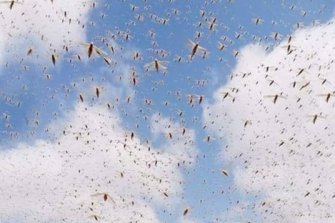Locust invasion could herald famine East Africa
East Africa is currently gripped by the worst locust invasion in decades. According to the UN, unless this invasion is swiftly brought under control, the livelihoods of some 20 million people will be at stake. In Kenya and Somalia, entire crops are being ravaged by insect swarms measuring several square kilometres. The same is also happening in Ethiopia, where HEKS/EPER has been active for many years. If no immediate action is taken, a famine could ensue. HEKS/EPER is therefore taking emergency action to aid the worst hit smallholders and cattle farmers in the Borana region.

The current situation
According to information from the Food and Agriculture Organization (FAO) of the United Nations, the first swarms of desert locusts reached Ethiopia in June 2019 – principally the Afar, Amhara, Oromia and Somali regions. Some desert locust swarms may number as many as 50 million insects. According to the FAO, the unusually protracted rainy season has favoured the locust infestation.
In the Borana region, where HEKS/EPER has been working for many years, the first major swarms arrived in early January 2020 from the neighbouring Somali region and from Kenya. By the end of February they had destroyed crops and pasture lands and laid eggs across an area of 45’435 square kilometres.
With the approach of «Ganna», Borana’s main rainy season, it is also time for sowing. But the rains will in turn favour locust numbers and the newly planted fields are in danger with the next generation of locusts already poised to strike – they will hatch in June. Those worst affected are smallholders and cattle farmers, who are dependent on harvests and pasture lands. The region’s already precarious food situation will be further compounded by the infestation.

